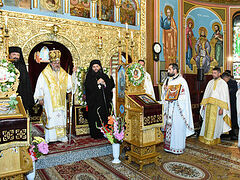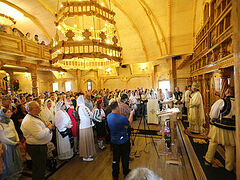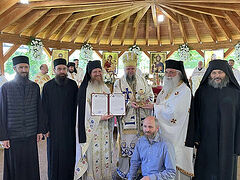Ellwood City, Pennsylvania, August 7, 2023
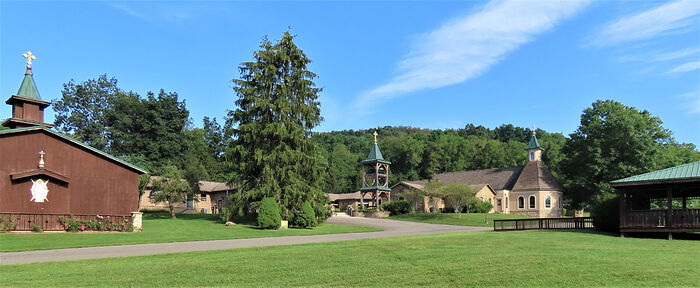 Photo: orthodoxmonasteryellwoodcity.org
Photo: orthodoxmonasteryellwoodcity.org
The Orthodox Monastery of the Transfiguration (Romanian Episcopate of the Orthodox Church in America) in Ellwood City, Pennsylvania, was blessed with a double celebration over the weekend.
In addition to its patronal feast of the Transfiguration, the monastery also celebrated the 55th anniversary of its consecration. The monastery was consecrated on September 28, 1968, one year after it was founded by Mother Alexandra (formerly Princess Ileana of Romania).
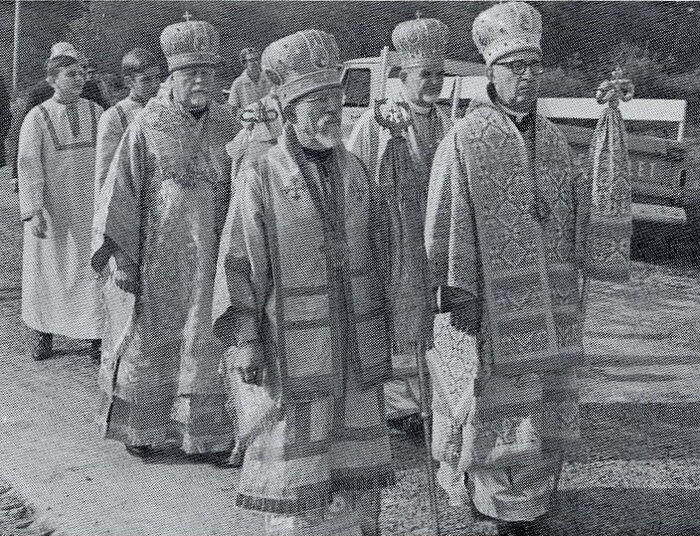 Hierarchs in procession to the consecration services at the monastery in 1968. Left to right are Metropolitan Ireney (Primate of the Metropolia), Bishop Amvrossy of Pittsburgh (Metropolia), Greek Bishop Gerasimos, Bishop Valerian of ROEA. Photo: oca.org
Hierarchs in procession to the consecration services at the monastery in 1968. Left to right are Metropolitan Ireney (Primate of the Metropolia), Bishop Amvrossy of Pittsburgh (Metropolia), Greek Bishop Gerasimos, Bishop Valerian of ROEA. Photo: oca.org
According to a newspaper article from the time, the monastery was jointly consecrated by Romanian, Russia, Greek, and Metropolia (later the OCA) bishops, as a testimony to Mother Alexandra’s dream that it be a truly pan-Orthodox monastery.
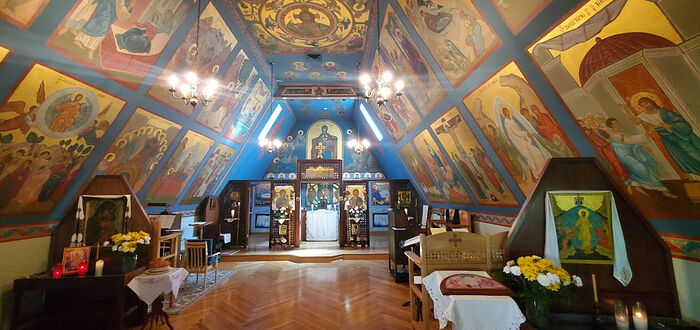 Photo: orthodoxmonasteryellwoodcity.org
Photo: orthodoxmonasteryellwoodcity.org
This year, the annual pilgrimage was led by His Beatitude Metropolitan Tikhon of Washington and All America and Canada.
The feast began with the All-Night Vigil on Saturday night, celebrated by a number of visiting clergy, in the presence of Met. Tikhon.
The service was livestreamed on the monastery’s YouTube page:
During the anointing, the current longtime abbess, Mother Christophora, spoke about the feast of the Transfiguration and the history of the monastery.
Mother Alexandra started our monastery, and she wanted all of you to feel welcome; she wanted all the sisters to feel welcome here, to be a pan-Orthodox monastery, and she chose this feast day for the monastery, because she wanted the monastery to be like a light on a hill. A light on the hill so that people would see something more than food, drink, newspapers… Those of us in the Orthodox Church, our inquirers into the Orthodox Church, you are finding that, “Wait a minute, there’s more to life than this daily routine.”
We are flesh and blood, so we have to eat and drink, but we also know that this is not the only life we are given… The three Apostles, Peter, James, and John, climb up the mountain. This is our daily, ascetical struggle—to hold your tongue when you want to say something bad. You have to climb to holiness… This is where it all happens; this is the Transfiguration. And here He is so bright, they couldn’t even look at Him, so they fell down on the ground… Peter, James, and John couldn’t bear it, they couldn’t bear that good news Jesus was showing them… and how much He has in store for us … What’s the purpose of all this fuss, all this stress? It’s just to climb the mountain, then we go down the mountain. We can’t stay here forever—not yet. We go down because we’re going back to bring this light that you get tonight at the monastery back to our family, bring it back to our jobs…
And following the Vigil Met. Tikhon spoke about the glory of the Lord that is revealed in the feast of the Transfiguration:
The feast of the Transfiguration is in many ways a very monastic feast. All the feasts of course can be called monastic feasts… But the transfiguration is really a monastic feast for a number of reasons, but first of all as we heard so many times throughout the hymns this evening and the Gospel, it is good for us to be here. As Christians, it’s always good to be together and worship together, but especially in a monastery; especially when we come in pilgrimage, there’s a certain grace that we feel in the monastery, and that grace is an expression of the glory of the Lord that we heard of so much through the hymns this evening.
But I think it’s also a very monastic feast because in the monastic life everything is turned upside down, everything goes in the opposite direction that the world goes. And I think Mother Christophora spoke a little bit about this before the anointing, but in the world, we start at the beginning and we try to go towards a goal. We go to school and we work so we can graduate. We get married so we can have a family, and we work hard so we can retire and enjoy retirement. So the hard work is at the beginning, and this goal is in the distance that we try to reach, but somehow it’s always elusive.
But in the spiritual life, it’s the opposite. The goal is given to us at the beginning. This is the feast of the Transfiguration: The Disciples beheld the Lord in His glory as far as they could bear it, before His Cross, before His Crucifixion. The world would say you must first go through the Cross to get to the glory, but the Church says “No, here’s the glory,” and the glory then gives us the grace and the strength to pass through the Cross as our Lord did… Moses didn’t fast and pray for 40 days to behold the glory of God—He beheld the glory of God and with that strength He went for 40 days and 40 nights. It’s the same with Elijah. When he was fed by the angel, it says he went on the strength of that food for 40 days. The glory comes first, and then the struggle…
So all of that to say that we should be grateful to the sisters for their sharing with us a bit of the glory of the Lord, which is why we’re here isn’t it? We come here because our world is dark and depressing and difficult and painful and full of depression and addiction and division in our families, divisions in our communities, divisions in our world, war, and these are the things that God did not want for us. He wanted us to behold His glory, to dwell in His glory and that’s why we live our lives as Orthodox Christians striving to attain that glory and why we rely on the experts in the spiritual life—the monastics who dedicate themselves every moment of the day to maintain the glory.
It’s not always easy, and it may not feel like they’re living a life of glory 24/7, but as we feel today, this evening, in this Vigil, we sense in a very tangible way the glory of God, because what is happening here? We are worshiping God. In the Gospel and Old Testament readings, everyone that sees the gory of God falls down and worships, and that’s what we, to the best of our ability, maybe in imperfect ways, not as poetically and elegantly as the Gospels or the Old Testament saints, but in our own way we fall down and we connect with that glory that is given to us freely by our Lord.
Glory to God for all things, and our gratitude to Mother Christophora and the sisters and all those who labor in the monastic life to give us some strength and encouragement in our own seeking of the glory of God, so that we might make some small steps in the direction of the Heavenly Kingdom.
The next morning, the Divine Liturgy was celebrated by Met. Tikhon and His Eminence Archbishop Melchizedek of Pittsburg and Western Pennsylvania on the monastery’s outdoor summer altar.
Pilgrims were blessed to venerate a portion of the relics of St. Herman of Alaska that were present for the feast.
Following the reading of the Holy Gospel, His Beatitude offered a homily on the practical theology of the Transfiguration (begins at 40:20 in the video of the Liturgy):
And following the Liturgy, His Beatitude offered another reflection on the Transfiguration:
In today’s homily I spoke of our potential as human beings, of our calling in Christ, not only to perceive the Divine Light of Tabor, but to be suffused with that light. The Transfiguration which we celebrate today is our longed-for destination, our hoped-for destiny, the eternal reality for which we strive. However, the Transfiguration is not just our future—it is our present.
According to Sts. Ignatus and Kalilistos, following the Venerable Mark the Monk, at the time of our Baptism, we already receive the fullness of the grace of God, the fullness of life. And since that time, we have covered over the garment of light that we then received with our daily sins, our perpetual indulgence with the passions. Rather than filling our life with what those hesychast fathers call the three foundations of every virtue: love, peace, and the constant remembrance of the name of the Lord, we have filled our lives with pettiness and triviality.
Through repentance and the practice of the virtues, however, we can recover the grace that God has already given us… We may slowly reveal the light that is already within us, so that both we and the world can benefit from that light. But even this effort which we might call asceticism, self-denial for the sake of God and neighbor, is not our own. As Mother Alexandra, the foundress of this monastery makes so abundantly clear in her meditation on the Lord’s Prayer, we have nothing to offer that was not given to us by God. By His original gift of grace, we recover the original gift of grace. By virtue of what He has already given us, we open up ourselves to receive the gift that is already within.
It is my hope that this pilgrimage has been an opportunity for all of us to share our little light with one another, so that we are all inspired, monastics and pilgrims alike, to redouble our own efforts to recover that light, to share that light with the world. For as Sts. Ignatius and Kallistos, Mark the Monk, and Mother Alexandra have all explained, wherever there is any true light, anything truly good, it is not of us, but of God. He is the light of the world, the light in us all, the light in Whom we shall see light. May His light shine more brightly for each of us and in each of us, illumining our lives with love and peace, filling all things with the glory of His holy name.
Once again, my thanks and blessings to the sisterhood of the Monastery of the Transfiguration for their hospitality. My sincere congratulations on the celebration of their 55th anniversary of this special place of prayer and as a source of light, and my greetings and blessings to all the pilgrims who have gathered here to receive the fruit of those prayers and the blessing of that light. Christ is in our midst.
Read more about Mother Alexandria, the foundress of the monastery, in the article, “Royal Lady, Pious Nun—Princess Ileana-Mother Alexandra.
Follow OrthoChristian on Twitter, Vkontakte, Telegram, WhatsApp, MeWe, and Gab!

